Coronavirus changes climate war
As businesses shut down, citizens lose their jobs and everyday life grinds to a halt, some activists are cheering the environmental benefits of COVID-19.
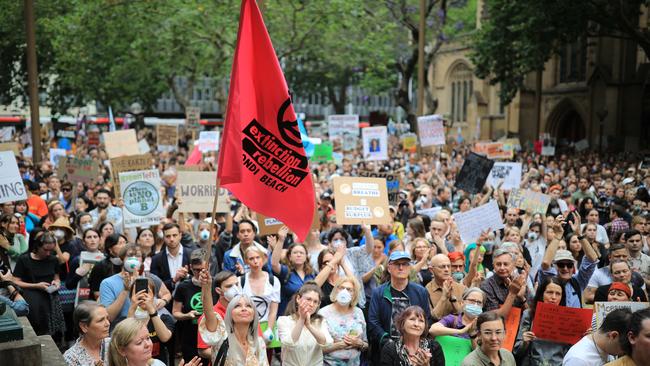
The COVID-19 pandemic has added fresh rancour to the climate change debate.
“Dear Greta,” former television meteorologist and popular US climate change blogger Anthony Watts began in an open letter to teenage climate campaigner Greta Thunberg last week.
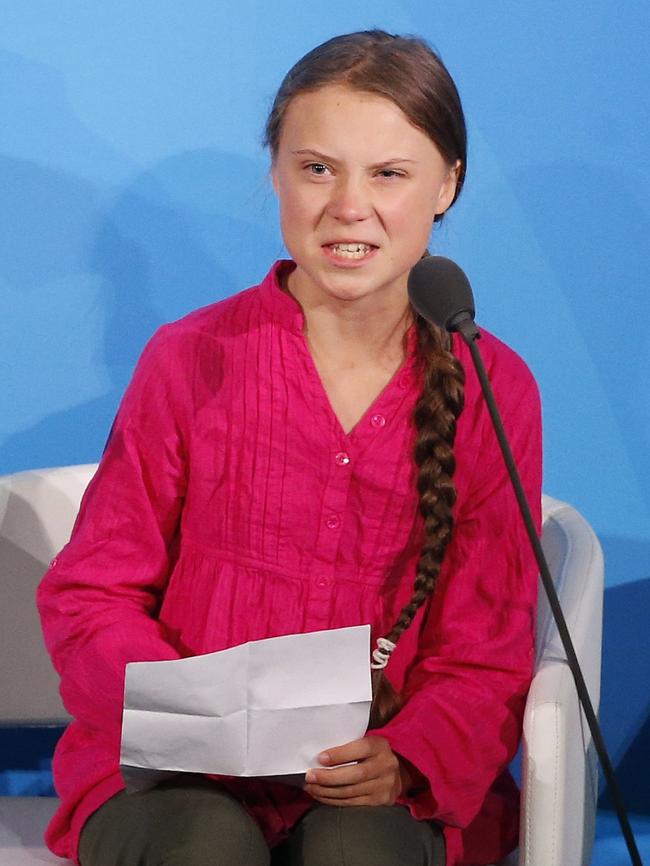
“So you got what you wanted. System change & economic slowdown is a real thing now. Airplanes, industry, jobs, restaurants, recreation, and schools are all shut down. Instead we have fear, poverty, misery, joblessness, economic ruin, and a bleak future. Happy now?”
On the other side, Spanish climate activist, astrophysicist and philosopher Martin Lopez Corredoira observes the world economy has been turned upside down in a matter of weeks.
“Neither Greenpeace, nor Greta Thunberg, nor any other individual or collective organisation (has) achieved so much in favour of the health of the planet in such a short time,” Lopez Corredoira wrote in a Science 2.0 blog post earlier this month.
“Venice … is now deathly silent. What a respite for the Venetians! What good news for the ecologists and tourist-haters!
“This positively affects the reduction of CO2 emission and … the destruction associated with holiday and professional conference tourism. It is certainly not very good for the economy in general, but it is fantastic for the environment.”
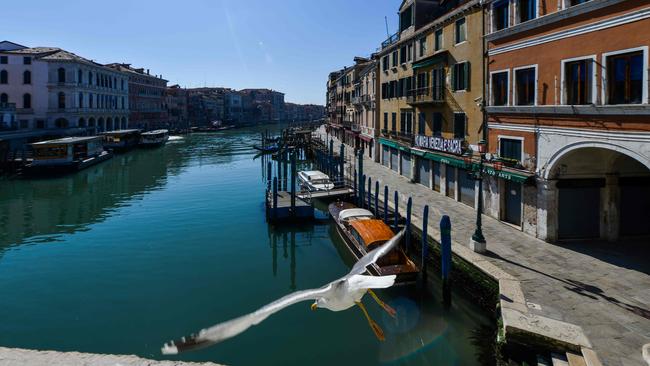
Lopez Corredoira said he did not wish ill on anyone but added: “Let us view the circumstance from an objective sociological point of view, without taking individuals into account, and think about the changes that are being produced in the world owing to the rise of this coronavirus.”
This is the emergency climate response that Extinction Rebellion has repeatedly been told was not possible. Yet the pandemic raises challenging questions for all sides of the environmental debate.
It piques strongly held positions on controversial topics — overpopulation, the treatment of wild animals, the politics of authoritarian rule and the role of technology,
The crisis provides a test bed to assess the impact on climate and broader environmental health of reducing industrial emissions for an extended period.
Already it has forced businesses to push harder on technologies to work remotely, communicate digitally and cut down on air miles and lunch.
Former UN climate leader Christiana Figueres says there is a silver lining to the challenge. “If we really sustain several months of reduced travel we may realise that we don’t have to travel as much,” she says. “Can this have actual behavioural change impacts … maybe, and let’s hope.”
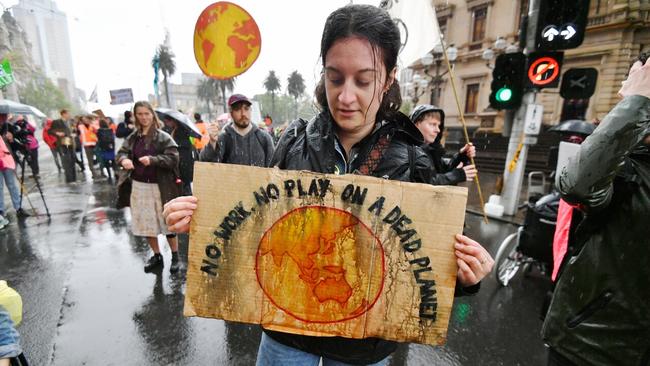
The internet is full of memes celebrating a form of nature’s revenge on humans.
But UN Secretary-General Antonio Guterres has made clear that tackling the coronavirus pandemic, not climate change, is now the world’s top priority. Guterres is still urging countries not to lose sight of the global warming challenge and the Paris climate accord but says all resources for now will be directed toward tackling the COVID-19 crisis.
China’s communist regime has been able to force obedience from citizens but a core weakness has been exposed in the capacity of others to trust information and statistics from the state.
Highlighted, too, has been the extraordinary extent to which the developed world has outsourced its industrial production to China.
These realities could have big implications for how the world might view China, including on the issue of climate change action, in future.
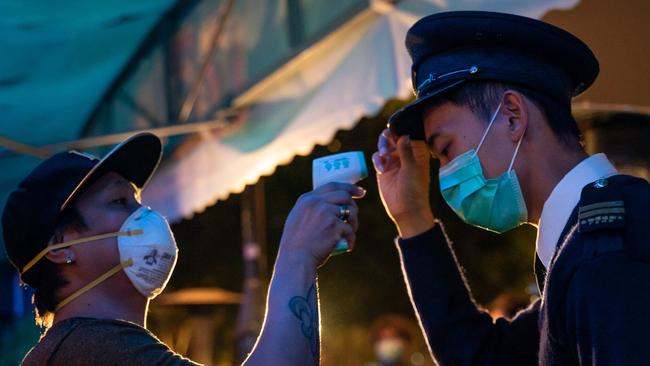
In tackling COVID-19 and climate change, the US is more likely to embrace technology and private industry for answers. Electric carmaker and space enthusiast Elon Musk has quickly thrust himself into the role of industrialist troubleshooter.
The teams of engineers assembled by Musk to inject his brand into the rescue of Thai students from flooded caves in 2018 have been told to turn their expertise to making ventilators for US hospitals.
New York City mayor Bill de Blasio responded directly to Musk on Twitter last week.
“New York City is buying!” de Blasio said. “Our country is facing a drastic shortage and we need ventilators ASAP — we will need thousands in this city over the next few weeks. We’re getting them as fast as we can but we could use your help! We’re reaching out to you directly.”
We’re at war and ventilators are our ammunition.
— Mayor Bill de Blasio (@NYCMayor) March 29, 2020
Join me to talk about how we keep supplies going to the front lines and answer questions from @salma1680, Colleen from Washington Heights and @AmazeByEric.
Use the hashtag #AskMyMayor to keep your questions coming, NYC! pic.twitter.com/OHBJvFvvTr
The speed and uncertainty of the COVID-19 pandemic has left the otherwise most vocal climate change groups unsure where to turn. Europe is winding back the pace of green measures and it looks increasingly likely that what was supposed to be a groundbreaking global climate change meeting in Glasgow in November will be postponed or cancelled.
The default position of renewable energy campaigners has been an attempt to make a virtue of the COVID-19 crisis.
International Energy Agency executive director Fatih Birol says he is working to influence world leaders to ensure their stimulus programs are rich with green initiatives.
“I am telling them that we can use the current situation to step up our ambition to tackle climate change,” Birol said last week.
“This is a historic opportunity for the world to, on one hand, create packages to recover the economy but, on the other hand, to reduce dirty investments and accelerate the energy transition.”
When the medical crisis eases, we will need to revitalise the world economy.@IEA is preparing a special World Energy Outlook report that will offer actionable measures for governments to support economic recovery & job creation while achieving structural emissions reductions. pic.twitter.com/cdnKeqsAdB
— Fatih Birol (@IEABirol) March 29, 2020
Closer to home, Australia’s Climate Council says now “is exactly the right time to be spending on renewable energy infrastructure and zero emissions technology”.
Another key message has been that leaders should trust the scientists on climate change, just as they are on the pandemic.
Not everyone is convinced this is a fair comparison.
US climate scientist Judith Curry says she does not accept that COVID-19 shows us how and why we need to act urgently on climate change.
“The main similarity between climate change and COVID-19 is they are both situations of deep uncertainty,” she says.
“Apart from the brainwashed Extinction Rebellion folk, no one feels the urgent visceral need to drop everything and ‘act’ on climate change.
Some thoughts on corona virus and deep uncertainty https://t.co/RttwFwMwSN via @curryja
— Judith Curry (@curryja) March 19, 2020
“The reason for that is that the potential adverse impacts of climate change have a long time horizon (decades to centuries), there is no simple ‘action’ that will reverse climate change, and premature actions could lock us into infrastructure that is not in our best long-term interests. And finally, diversion of all our resources to the climate change problem could make us more vulnerable to more urgent problems such as COVID-19.”
Curry says it remains to be seen what lessons will eventually be learned from the pandemic.
But there will be a new understanding of the loss of productivity from unnecessary business travel and a new questioning of international cruising.
There also may be some new data on the impact on climate of depressed economic activity.
NASA scientists have been able to track the steep decline in nitrogen dioxide levels over China in January and February to coincide with the lockdown of Chinese production because of the coronavirus outbreak in Wuhan.
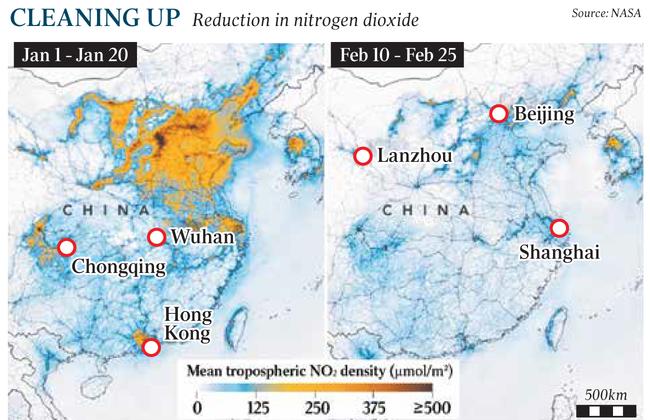
The decline in pollution levels began over Wuhan and then spread across the country.
As lockdowns spread in Europe and North America, the impact on industry will mirror the 2008 global financial crisis, which resulted in a significant fall in global greenhouse gas emissions.
The shutdown of international air travel will allow a more thorough test of studies conducted after the September 11, 2001, terror attacks in the US.
Those studies claimed a temporary stop to air flights over North America had a noticeable impact on climate.
A reduction in vapour trails, or contrails, it was claimed, had been responsible for a greater subsequent spread in temperatures between day and night.
In 2004, NASA scientist Patrick Minnis wrote that “increased cirrus coverage, attributable to air traffic, could account for nearly all of the warming observed over the United States for nearly 20 years starting in 1975”.
The warming effect happened because the high-altitude clouds that contrails created tended to trap warm air, Minnis wrote. On balance, though contrails can both warm and cool, there is more of a warming effect.
Last year, Scientific American said the contrails left by aeroplanes were now so widespread that their warming effect was greater than that of all the carbon dioxide emitted by aeroplanes that had accumulated in the atmosphere since the first flight of the Wright brothers.
Meanwhile, studies already are under way to see if the shutdown in industrial production will have a measurable impact on atmospheric concentrations of carbon dioxide in the northern hemisphere.
Not so far.
Many will be hoping the bigger environmental impact will be on the illegal trade in bush meat and a greater preservation of wildlife.
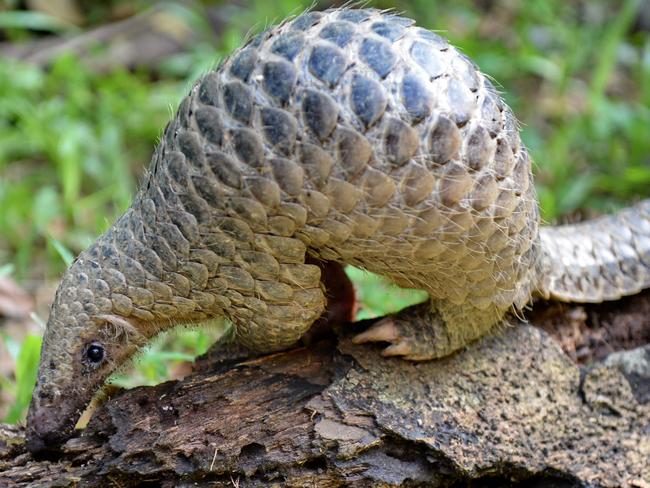
There is a long history of Chinese abuses of the pangolin, or scaly anteater, a living dinosaur and the likely host to the COVID-19 virus.
Pangolin scales traditionally have been cooked in oil, butter, vinegar, boys’ urine or roasted with earth or oyster shells to cure a variety of ills, including excessive nervousness and hysterical crying in children, women possessed by devils and ogres, malarial fever and deafness.
According to an article in the journal Nature in 1938 that described the uses, pangolin numbers already were in peril because of Chinese demand.
Russian billionaire and British media owner Evgeny Lebedev has said it would be sweet irony if the COVID-19 virus were the saviour of the world’s most highly illegally traded animal.
Lebedev is patron of the conservation organisation Space for Giants and has visited wet markets such as those in Wuhan where COVID-19 is believed to have bred from bats, through pangolins, to become a threat to humans.

US environmentalist Michael Shellenberger agrees.
“Who would have thought that the wet live markets in China would be a major source of global chaos and economic challenge and mass death, but that is the reality,” Shellenberger says.
“The animals are on top of each other and they are very unsanitary. Experts have been warning about those markets for two decades now.
“One of the things that ought to come out of this is that there ought to be some effort internationally to make sure countries get rid of these markets that are breeding grounds for these viruses and help countries move to more modern forms of meat production.
“The truth is that economic growth and lifting people out of poverty has been the most important way to reduce air pollution and negative impacts on the environment.”
The success of the developed world’s response to the COVID-19 pandemic has significant implications for how the world will deal with climate change into the future.


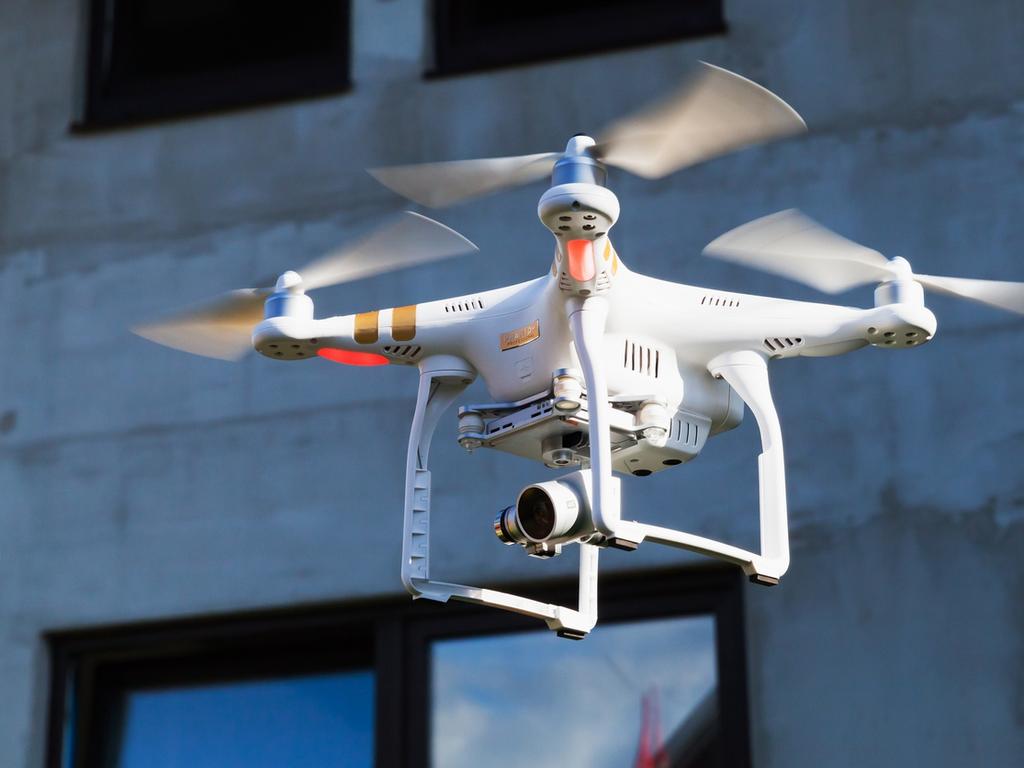



To join the conversation, please log in. Don't have an account? Register
Join the conversation, you are commenting as Logout